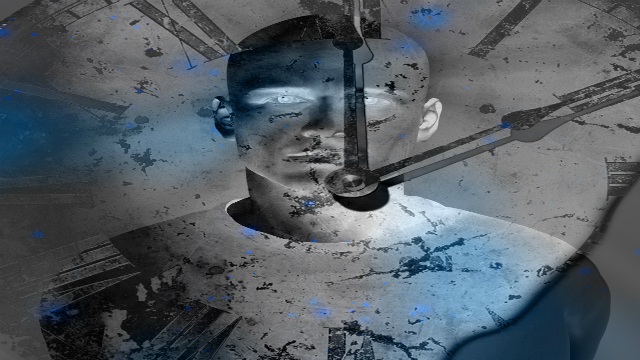
Phenomenalism
Ever wondered what happens to things behind your back? Philosophers have studied this problem intently, and some have reached a simple conclusion: they vanish. Well—not exactly. Some philosophers, known as “phenomenalists”, believe that things only exist insofar as they are perceived. In other words, your burger only exists so long as you are aware of its existence. So as for trees that fall in forests with no one around to hear them; they don’t. No perception, no existence. That is phenomenalism in a nut-shell.
Presentism
Time is something we take for granted: if we consider it for a moment, we normally divide it simply into the past, the present and the future. The philosophy of ‘Presentism’ believes that there is neither a past nor a future; only the present exists. Your last semester didn’t exist and every word in this article ceases to exist after you look at it—until you look back at it again. The future does not exist, as time cannot be before and after simultaneously.
When I read about these concepts I get amazed and my imagination starts drifting. No one knows how we came into existence. Only different philosophies exist but we do possess the capability to think and this is how we try to depict and relate new things.
In my views, Phenomenalism and Presentism are both related. Something comes into existence only when we acquire the knowledge about it. Each mill-second a new event occurs but we don’t know about it, so its existence doesn’t matter to us, we are ignorant of the changes that don’t bother us. But when a light shines on the things we were simply oblivious too, its existence is presented to us. If we didn’t have any prior knowledge of an outcome i.e. if something is happening or not; it never happens to us and never will. This is what Phenomenalism believes. On the other hands, if I talk about Presentism, the only present exists. The time in which we are living matters to us and the time of past has vanished, its existence hardly matters to us and the future is ambiguous. No one knows what will happen tomorrow or will it even happen? Maybe we all will be dead before tomorrow arrives. This puts the existence of future in question. We know the time we are living is now and each mile-second which is gone becomes the past.
We often hear from our elders, “Try to live in the present, the future will get created itself.” From the time we are born, the conversion of moments starts happening and at the time of death, the present and future halts, is this not a dis-balance? Because the past remains forever.
I believe otherwise. The past remains in the memories of one's life which is related to that person and he/she can keep on making it, history never dies so do that person.
Confronting the bigger picture – Every moment we are living constitutes our present, each second passing becomes our past and each mile-second spawns a new future. It means the span of generation of future is equal to the time of the passing of past, or we can say the amount of moment passing is directly proportional to the amount of moment created. Law of Conversation of energy states “Energy can neither be created nor be destroyed, it can only be transformed from one form to another” if I try to relate it, “A moment can neither be created nor be destroyed, it can only get converted from past to future through the present” Is it?
Again, Newton’s third law of states that- “For every action, there is an equal and opposite reaction.” So according to it, every moment is trying to make a force (impact) on different moment i.e. future is trying to force past to make it come into existence and present is trying to repel both equally so that everything becomes stable. Is it?
Our past, present and future exits because we have the capability to think about it but do these three things exits for animals? How would they justify the time and space relation concept? They only believe in what they see i.e. phenomenalism, things they didn’t saw never happened to them.
Is this the working of this world? Or it works On the senses created by us. Senses which helps us to decide maybe it is possible but I don’t know exactly.
Again let's try to mold it a bit.
The great scholar of Buddhism, Fyodor Shcherbatskoy said, “Everything past is unreal, everything future is unreal, everything imagined, absent, mental . . . is unreal. . . . Ultimately real is only the present moment of physical efficiency.”
But what will happen if everyone on Earth closes their eyes and ears for a minute? Will Phenomenalism and Presentism still hold true? Phenomenalism is believing in what one saw if we didn’t saw or heard anything; that moment never happened for any of us. Isn’t it?
But the conversion of moments happens for us. Time never stops. But how would we say that the past one minute which has gone by even existed in the first place?
- Shubham Malik
Congratulations @shubhammalik! You received a personal award!
You can view your badges on your Steem Board and compare to others on the Steem Ranking
Do not miss the last post from @steemitboard:
Vote for @Steemitboard as a witness to get one more award and increased upvotes!
Downvoting a post can decrease pending rewards and make it less visible. Common reasons:
Submit